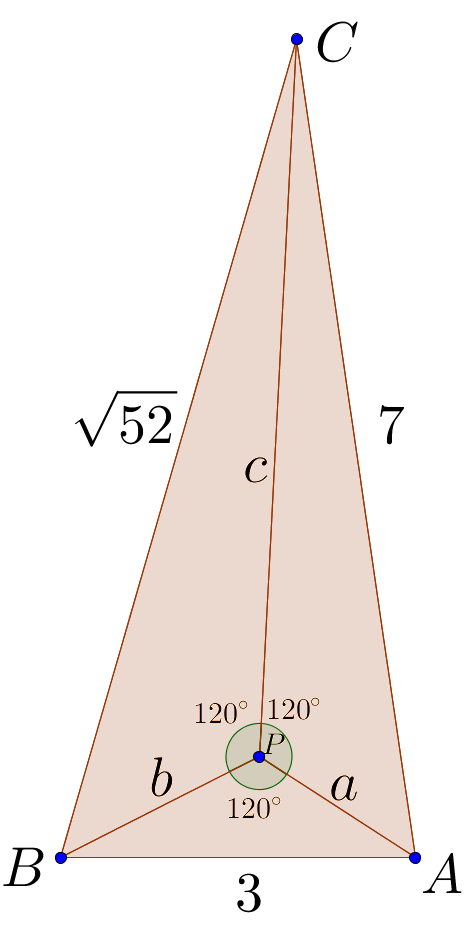Not ordinary equations!
⎩ ⎪ ⎨ ⎪ ⎧ a 2 + a b + b 2 b 2 + b c + c 2 c 2 + c a + a 2 = = = 9 5 2 4 9
Let a , b and c be real numbers satisfying the system of equations above.
Compute the integral value of a 2 4 9 b 2 + 3 9 b c + 9 c 2 .
Hint : See the topic of this question.
Source : HMMT
The answer is 52.
This section requires Javascript.
You are seeing this because something didn't load right. We suggest you, (a) try
refreshing the page, (b) enabling javascript if it is disabled on your browser and,
finally, (c)
loading the
non-javascript version of this page
. We're sorry about the hassle.
1 solution
woww, what a beautiful solution;)
Rewrite the equations as: a 2 + b 2 − 2 a b cos ( 1 2 0 ∘ ) = 3 2 . . . b 2 + c 2 − 2 b c cos ( 1 2 0 ∘ ) = 5 2 2 . . . c 2 + a 2 − 2 c a cos ( 1 2 0 ∘ ) = 7 2 . . . ( 1 ) ( 2 ) ( 3 )
By law of cosines and the fact that the three angles add up to 3 6 0 ∘ , we can construct the following triangle: By Heron's formula, the total area is
[
A
B
C
]
=
6
3
. Now, considering the small triangles and adding their areas we also get
[
A
B
C
]
=
(
a
b
+
b
c
+
c
a
)
2
sin
(
1
2
0
∘
)
, then:
By Heron's formula, the total area is
[
A
B
C
]
=
6
3
. Now, considering the small triangles and adding their areas we also get
[
A
B
C
]
=
(
a
b
+
b
c
+
c
a
)
2
sin
(
1
2
0
∘
)
, then:
a b + b c + c a = ± 2 4 . . . ( 4 ) (see why it can also be negative and how the triangle changes).
By adding ( 1 ) , ( 2 ) and ( 3 ) we get 2 ( a 2 + b 2 + c 2 ) + a b + b c + c a = 1 1 0 , and use ( a + b + c ) 2 = a 2 + b 2 + c 2 + 2 ( a b + b c + c a ) to get 2 ( a + b + c ) 2 − 3 ( a b + b c + c a ) = 1 1 0 . Replace the value of ( 4 ) to get:
a + b + c = ± 5 5 ± 3 6 . . . ( 5 )
Ssubtract ( 2 ) from ( 1 ) to get with ( 5 ) :
( a + b + c ) ( a − c ) = − 4 3 ⟹ c = a ± 5 5 ± 3 6 4 3 . . . ( 6 )
Similarly, subtract ( 3 ) from ( 2 ) :
( a + b + c ) ( b − a ) = 3 ⟹ b = a ± 5 5 ± 3 6 3 . . . ( 7 )
Substitute ( 6 ) and ( 7 ) in ( 5 ) :
3 a ± 5 5 ± 3 6 4 6 = ± 5 5 ± 3 6 ⟹ a = ± 3 5 5 ± 3 6 ( 5 5 ± 3 6 ) − 4 6
Find b and c :
b = ± 3 5 5 ± 3 6 ( 5 5 ± 3 6 ) − 3 7
c = ± 3 5 5 ± 3 6 ( 5 5 ± 3 6 ) + 8 3
We get four solutions combining the ± and the ± signs: ( a , b , c ) = ( 9 1 1 5 , 9 1 1 8 , 9 1 5 8 ) , ( − 9 1 1 5 , − 9 1 1 8 , − 9 1 5 8 ) , ( − 1 9 9 , − 1 9 6 , 1 9 3 4 ) , ( 1 9 9 , 1 9 6 , − 1 9 3 4 )
Only the last two pairs give us an integer value for the asked expression, so:
a 2 4 9 b 2 + 3 9 b c + 9 c 2 = 9 2 4 9 ( 6 ) 2 + 3 9 ( 6 ) ( − 3 4 ) + 9 ( − 3 4 ) 2 = 8 1 4 2 1 2 = 5 2 .